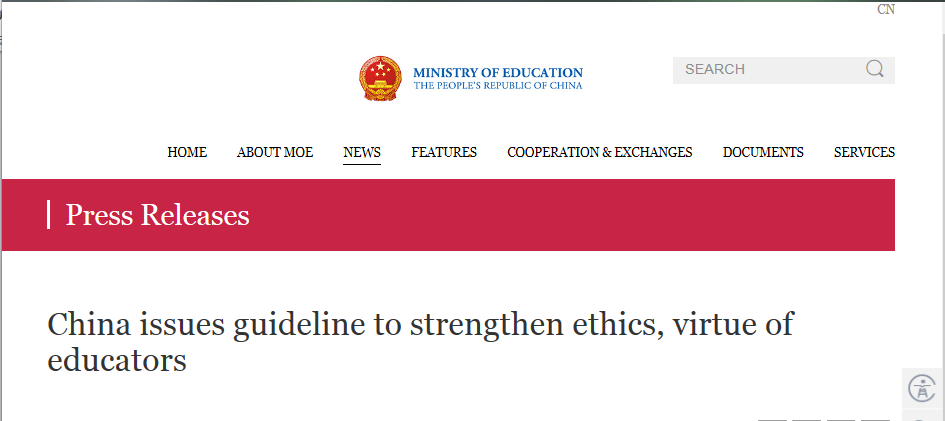China's Ministry of Education, together with six other government departments, on Monday issued a new guideline on teachers' professional ethics. The guideline covers all faculties across the country, from elementary to higher education institutions.
As part of the 15 measures mentioned, the guidance requires educational institutions to take priority over the professional ethics of teachers through regular evaluations and occupational accreditation, and to build a complete learning mechanism for teachers. The newly issued document also emphasizes that teachers' ethics should also be taken into account during recruitment.

China's Ministry of Education, together with other government departments, has released a guideline on the ethics, virtue of educators. /Screenshot
China's Ministry of Education, together with other government departments, has released a guideline on the ethics, virtue of educators. /Screenshot
Ren Youqun, an official with the ministry detailed the document at a press conference on Monday, saying that serious violation would result in a lifetime ban from teaching. He also affirmed zero tolerance of sexual harassment on campus in response to the recent occurrences at some universities.
Earlier this month, a female student at Shanghai University of Finance and Economics accused a professor of sexual harassment, who was then dismissed by the university after investigation.
Students and teachers have been voicing their opinions since the guideline was released. Some students shared their experiences on Weibo, arguing that that reporting misdemeanors on campus did not actually work, and that they had to complain on social media platforms instead. Some teachers said that their jobs were very difficult as they had to serve both students and their parents.
China, in fact, is not the only country to implement guidelines on the ethics of educators. In the United States, a code regulated by the Association of American Educators has been in place, which lists principles of ethical conduct to students, practices and performance, as well as to colleagues. In other parts of Asia, Singapore has also introduced in a code for professional conduct of its school leaders and education officers, aiming to help teachers uphold appropriate boundaries with students.
Last November, China's education authority released guidelines on teacher decorum. The new document further strengthens the management of teacher's professional ethics and asks educational institutions to make public complaint hotline numbers and e-mail addresses, according to the China News Service. In addition, it calls on the public to show their respect to teachers and support their daily teaching work.
Ren added at the press conference that the educational authority will work with local departments and schools to enforce the rule and enhance supervision.